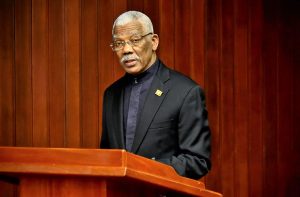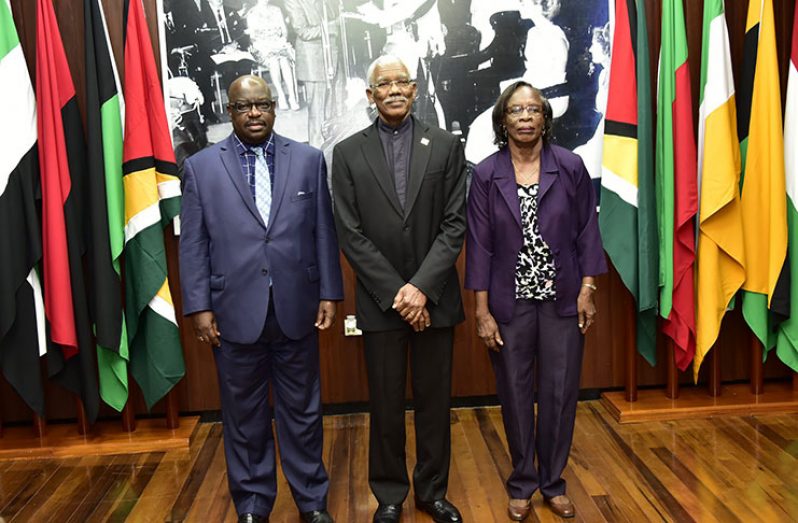PRESIDENT David Granger on Wednesday emphasised that the Public Utilities Commission (PUC) is the guardian of the public interest, shortly after he administered the oath of office to two new commissioners of the body.
The new commissioners are: Dr. Leyland Marvin Lucas and Ms. Verlyn Dawn Eleanor Klass. The commission, in accordance with the Public Utilities Commission Act 2016, is tasked with regulatory, investigative, enforcement and other functions conferred by the Act and other public utility laws.
The commission, under Section 24 of the ‘Act’, is vested with the power “…to initiate and conduct investigations into the operations and standards of service of any public utility and telecommunications undertaking.”
The swearing-in ceremony was held at State House in the presence of Minister of State, Mrs. Dawn Hastings-Williams; Minister of Business, Haimraj Rajkumar; and Ms. Dela Britton, Chairperson of the PUC.
The President said the PUC has the responsibility to ensure that utility services are delivered to the people in a manner that is “safe, adequate, efficient, reasonable and non-discriminatory.”
The commission, he said, in so doing, is tasked with ensuring that the public utility laws are upheld. “Electricity powers homes, industry, offices and schools; telecommunication services allow citizens to communicate with each other; transportation moves people and goods, and water is necessary for life and human activity,” the President said.

Underscoring that public utility services are provided, usually, to large sections of a population across networks, the President said in order to ensure a high quality of life for citizens, the PUC improves production and productivity and promotes national integration.
“Gov’t is committed to ensuring that citizens can have easy access to public services and to public utility services. The country’s relatively large size, low population density and numerous small, isolated hinterland and riverine communities increase the costs, reliability and quality of such services,” President Granger said.
President Granger said government has been decentralising access to public services through its policies of regionalisation and local democracy. “Capital towns – at Bartica, Mabaruma, Mahdia and Lethem – have been established in our hinterland regions in order to boost their development and to ensure that public services, including public utilities, are delivered to the people,” he noted.
Further, he said, local government elections – held twice in three years – are part of the renewal of local democracy aimed at electing leaders and councils to make decisions and take actions to improve public services within their communities.
“Government is investing in improving public utility services. Wells are being drilled in remote communities to provide water. Internet access is being expanded across the country to improve communication. Un-served communities are being linked to the national electricity grid and other communities are being provided with solar-generated electricity. Public infrastructure – aerodromes, bridges, roads and stellings – are being extended and upgraded to improve transportation,” President Granger explained.
He said public utilities are essential services to which citizens are entitled and government’s expressed policy is to ensure that citizens enjoy greater access to adequate, reliable and quality public services and public utility services.
President Granger said public utilities, because of their essential character and the desirability of universal coverage, must be regulated in the public interest which, in so far as public utility services are concerned, is three-fold.
These are, he said: first, to ensure that, as far as possible, public utility services are accessible, adequate and provided on a non-discriminatory basis; second, that costs, fees and tariffs associated with their provision or sale are reasonable; and third, that these services are regular, reliable, efficient and safe.
The work of the Public Utility Commission, therefore, he said is vital to protecting the public interest by ensuring the delivery of public services. “Government expects that the Commission will continue to ensure that citizens’ welfare will be continuously enhanced through the provision and delivery of public utility services,” the President said.




.png)









